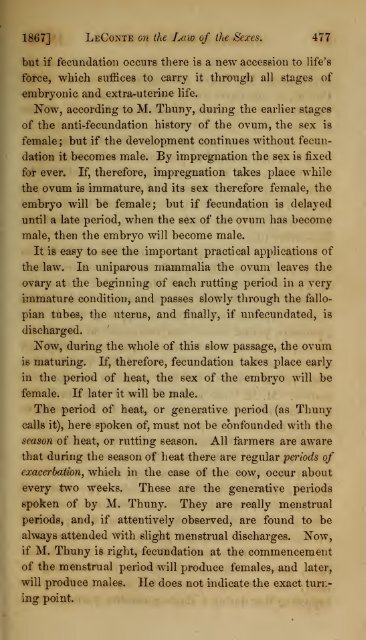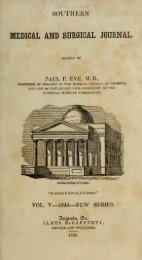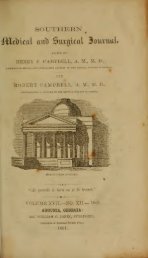Southern Medical and Surgical Journal - Georgia Regents University
Southern Medical and Surgical Journal - Georgia Regents University
Southern Medical and Surgical Journal - Georgia Regents University
You also want an ePaper? Increase the reach of your titles
YUMPU automatically turns print PDFs into web optimized ePapers that Google loves.
1867] LeConte on the Law of the Sexes. 477but if fecundation occurs there is a new accession to life'sforce, which suffices to carry it through all stages ofembryonic <strong>and</strong> extra-uterine life.Now, according to M. Thuny, during the earlier stagesof the anti-fecundation history of the ovum, the sex isfemale ; but if the development continues without fecundationit becomes male. By impregnation the sex is fixedfor ever. If, therefore, impregnation takes place whilethe ovum is immature, <strong>and</strong> its sex therefore female, theembryo will be female; but if fecundation is delayeduntil a late period, when the sex of the ovum has becomemale, then the embryo will become male.It is easy to see the important practical applications ofthe law. In uniparous mammalia the ovum leaves theovary at the beginning of each rutting period in a veryimmature condition, <strong>and</strong> passesslowly through the fallopiantubes, the uterus, <strong>and</strong> finally, if unfecundated, isdischarged.Now, during the whole of thisslow passage, the ovumis maturing. If, therefore, fecundation takes place earlyin the period of heat, the sex of the embryo will befemale.If later it will be male.The period of heat, or generative period (as Thunycalls it), here spoken of, must not be confounded with theseason of heat, or rutting season.All farmers are awarethat during the season of heat there are regular periods ofexacerbation, which in the case of the cow, occur aboutevery two weeks. These are the generative periodsspoken of by M. Thuny. They are really menstrualperiods, <strong>and</strong>, if attentively observed, are found to bealways attended with slight menstrual discharges. Now,if M. Thuny is right, fecundation at the commencementof the menstrual period will produce females, <strong>and</strong> later,will produce males. He does not indicate the exact turningpoint.








